-
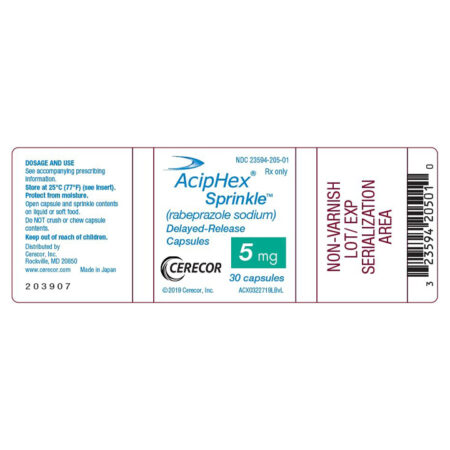
Aciphex
$66.60View productsCommon useAciphex is an antiulcer medication which inhibits a proton pump (PPIs) and blocks the production of acid by the stomach. Biochemically it blocks the (H+,K+)-ATPase enzyme system hereby inhibiting the final stage of hydrochloric acid production. After peroral intake of Aciphex antisecretorial effect is reached during one hour and is maximal in 2-4 hours. This medication is used to treat ulcers in stomach, Zollinger-Ellison syndrome, gastroesophageal reflux disease, to eradicate Helicobacter pylori in patients with ulcers in stomach or chronic gastritis.Dosage should be administered by your doctor depending on your condition. Usually in patients with an acute duodenal ulcer and c it is recommended to take 1 tab (20 mg) in the morning one time a day during 4-6 weeks. When treating H. pylori infection, Aciphex may be needed for only a week. Follow all recommendations of your doctor and do not take this drug in larger amounts than it was prescribed to you. Tablets should be swallowed whole. Do not crush, split or chew them. Take Aciphex with or without meals with a big glass of water since food has little effect on its absorption.Notify your doctor if you have a severe liver disease, cancer of stomach before taking this drug. The use of Aciphex in children is not recommended. It is not expected to be harmful to an unborn baby, though inform your doctor if you are pregnant or breastfeeding. Some conditions are treated with a combination of Aciphex and antibiotics, so to achieve the maximal effect from treatment, use all of your medications as directed by your doctor.Pregnancy, breastfeeding, hypersensitivity to Aciphex or a substituted benzimidazoles: omeprazole (Prilosec, Zegerid), lansoprazole (Prevacid), pantoprazole (Protonix), rabeprazole (Aciphex), and esomeprazole (Nexium).Together with symptoms of allergy (hives, rash, swelling of tongue and face) the following side effects may occur: headache, dizziness, dry mouth, upset stomach or diarrhea, constipation, insomnia, nervousness, rash, or itching. Contact your doctor for help if any of the listed side effects is severe or persistent.Co-administration with the medications which absorption depends on acidity of the stomach causes interaction of medications. Aciphex and other PPIs reduce the absorption and concentration in blood of ketoconazole (Nizoral) and increase the absorption and concentration in blood of digoxin (Lanoxin) causing reduction of effectiveness of the former and increase of toxicity of the latter.If you missed a dose take the medication as soon as you remember. If it is almost time for your next dose just skip its intake and return to your regular schedule.Symptoms of Aciphex overdose are unknown. If you consider that you took too much of the drug seek emergency medical attention.Store at room temperature between 59-77 F (15-25 C) away from light and moisture, kids and pets.We provide only general information about medications which does not cover all directions, possible drug integrations, or precautions. Information on the site cannot be used for self-treatment and self-diagnosis. Any specific instructions for a particular patient should be agreed with your health care adviser or doctor in charge of the case. We disclaim reliability of this information and mistakes it could contain. We are not responsible for any direct, indirect, special or other indirect damage as a result of any use of the information on this site and also for consequences of self-treatment.
-
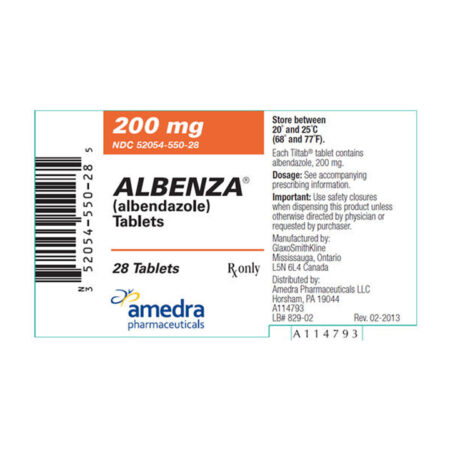
Albenza
$267.30View productsAlbenza is a member of the benzimidazole compounds used as a drug indicated for the treatment of a variety of worm infestations. It is a broad spectrum anthelmintic, effective against: roundworms, tapeworms, and flukes of domestic animals and humans.As a vermicidal, albendazole causes degenerative alterations in the tegument and intestinal cells of the worm by binding to the colchicine-sensitive site of tubulin, thus inhibiting its polymerization or assembly into microtubules. The loss of the cytoplasmic microtubules leads to impaired uptake of glucose by the larval and adult stages of the susceptible parasites, and depletes their glycogen stores. Degenerative changes in the endoplasmic reticulum, the mitochondria of the germinal layer, and the subsequent release of lysosomes result in decreased production of adenosine triphosphate (ATP), which is the energy required for the survival of the helminth. Due to diminished energy production, the parasite is immobilized and eventually dies.
-
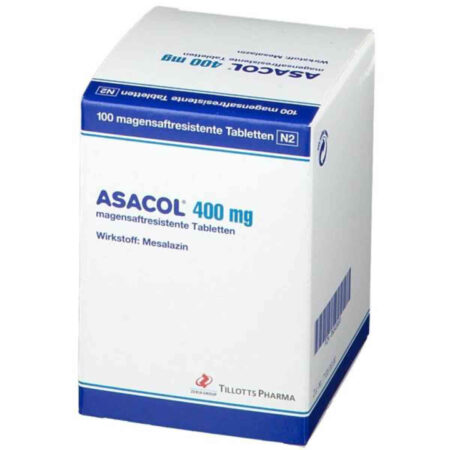
Asacol
$162.90View productsAsacol (mesalamine delayed-release tablets) tablets are indicated for the treatment of mildly to moderately active ulcerative colitis and for the maintenance of remission of ulcerative colitis.
-
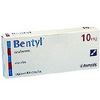
Bentyl
$63.90View productsBentyl (Dicyclomine) is used for treating symptoms of irritable bowel syndrome.
-
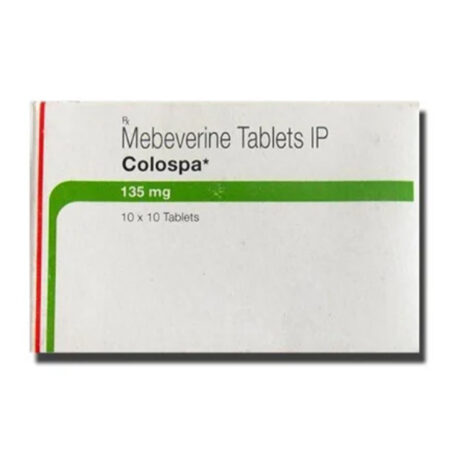
Colospa
$84.60View productsColospa prevents nerve signals passing through to the muscle in the intestines. It helps the muscle to relax, preventing painful spasm.
-
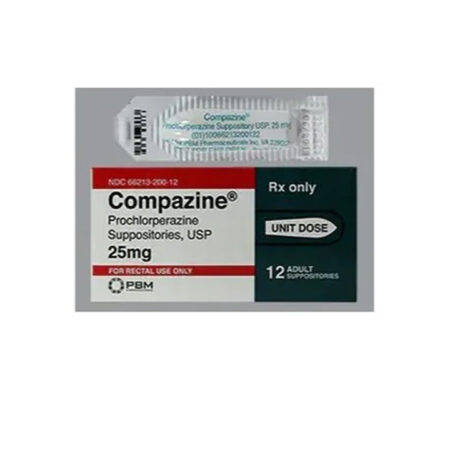
Compazine
$39.60View productsCompazine is an anti-psychotic medication which is used to treat psychotic disorders such as schizophrenia. Compazine is also used to control severe nausea and vomiting and to treat anxiety. Compazine changes the actions of chemicals in your brain. Compazine is usually used as tranquilizer and antipsychotic drug.Take it orally with a full glass of water, with or without food or milk.The recommended dose for adults depend on the type of disease:To Control Severe Nausea and VomitingThe usual dosage is one 5-milligram or 10-milligram tablet 3 or 4 times a day.For Non-psychotic AnxietyThe usual dose is 5 milligrams, taken 3 or 4 times a day.Relatively Mild SchizophreniaThe usual dose is 5 or 10 milligrams, taken 3 or 4 times daily.Moderate to Severe SchizophreniaDosages usually start at 10 milligrams, taken 3 or 4 times a day.More Severe SchizophreniaDosages may range from 100 to 150 milligrams per day.The recommended dose for children also depends from type of disease, weight and their age:Children under 2 years of age or weighing less than 20 pounds should not be given Compazine.For Severe Nausea and VomitingAn oral dose of Compazine is usually not needed for more than 1 day.Children 20 to 29 PoundsThe common dose is 2-0.5 mg 1 or 2 times daily. Do not give over 7.5 mg daily.Children 30 to 39 PoundsThe usual dose is 2-0.5 mg 2 or 3 times daily. Do not give over 10 mg daily.Children 40 to 85 PoundsThe usual dose is 2-0.5 mg 3 times daily, or 5 mg 2 times daily. Do not give over 15 mg.For Psychotic DisordersChildren 2 to 5 Years OldThe starting oral or rectal dose is 2-0.5 mg 2 or 3 times daily. Do not give over 10 mg the first day and 20 mg thereafter.Children 6 to 12 Years OldThe starting oral or rectal dose is 2-0.5 mg 2 or 3 times daily. Do not give over 10 mg the first day and 25 mg thereafter.this instruction presented here just for review. It’s necessary to consult your doctor before using. It will help you to get best results.Use Compazine with cautions in people with hepatic or renal disease, glaucoma, prostatic hypertrophy, severe asthma, prolonged use, cardiovascular disease, epilepsy. Do not use in children under 5 years age. Compazine should not be used during pregnancy,when you plan to become pregnant or during lactation without doctor’s advice. Do not use Compazine before breast-feeding without doctor’s permission.ContraindicationsCompazine is not allowed to people who are hypersensitive to any components of this drug. Contraindicated in people with severe toxic CNS depression, coma, subcortical brain damage, bone marrow depression,severe liver or cardiac disease, narrow-angle glaucoma, pediatric surgery.They may include all types of an allergic reaction. Also the most possible side effects include:twitching or uncontrollable movements of your eyes, tongue, lips, face, arms, or legs;tremor, drooling, trouble swallowing, problems with balance or walking;feeling restless, jittery, or agitated;high fever, stiff muscles, confusion, sweating, fast or uneven heartbeats, rapid breathing;feeling like you might pass out;seizure (black-out or convulsions);decreased night vision, tunnel vision, watery eyes, increased sensitivity to light;nausea and stomach pain, skin rash, and jaundice (yellowing of the skin or eyes);pale skin, easy bruising or bleeding, fever, sore throat, flu symptoms;urinating less than usual or not at all;joint pain or swelling with fever, swollen glands, muscle aches, chest pain, vomiting, unusual thoughts or behavior, and patchy skin color;slow heart rate, weak pulse, fainting, slow breathing (breathing may stop).Less serious include:dizziness, drowsiness, anxiety;sleep problems (insomnia), strange dreams;dry mouth, stuffy nose;blurred vision;constipation;breast swelling or discharge;a missed menstrual period; weight gain, swelling in your hands or feet;impotence, trouble having an orgasm;mild itching or skin rash;headache.If you experience one of them stop using Compazine and tell your doctor as soon as possible. Also consult your doctor about any side effect that seems unusual.Also note that an interaction between two medications does not always mean that youmust stop taking one of them. Usually it affects the the effect of drugs, so consult your doctor about how these interactions are being managed or should be managed.If you forgot to take your dose in time, please do it as soon as you remember. But do not take if it is too late or almost time for your next dose. Do not increase your recommended dose. Take your usual dose next day in the same regularly time.Sympotms of Compazine overdose may include dry mouth, constipation, bloating or stomach cramps, extreme drowsiness or feeling restless and agitated, changes in heart rate, fever, and fainting. If you experience one of them or any unusual symptoms call your doctor immediately.Store at room temperature between 20-25 C (68-77 F).We provide only general information about medications which does not cover all directions, possible drug integrations, or precautions. Information on the site cannot be used for self-treatment and self-diagnosis. Any specific instructions for a particular patient should be agreed with your health care adviser or doctor in charge of the case. We disclaim reliability of this information and mistakes it could contain. We are not responsible for any direct, indirect, special or other indirect damage as a result of any use of the information on this site and also for consequences of self-treatment.
-

Cytotec
$36.20View productsCytotec is a medication with anti acidic activity used to prevent formation of stomach ulcers in patients who take NSAIDs such as aspirin or ibuprofen. Its main component is Misoprostol, it is a synthetic prostaglandin, the substance which is produced in a stomach. Their role consists in protecting inner lining of the stomach from destructive action of NSAIDs which are supposed to destruct natural prostaglandins in the stomach. Cytotec is active starting within 30 minutes since its intake and continues for about 3 hours.The recommended dose for adults is 0.2 mg taken 3-4 times daily with a meal. The last dose is taken before bedtime. In case of bad tolerance the dose should be reduced up to 0.1 mg.Due to ability of Cytotec to provoke diarrhea, it must be used very cautiously in patients with inflammatory bowel disease or any other condition to avoid dangerous conditions caused by considerable loss of fluid. The risk is diminished by taking the medication with food. Also avoid taking it with a magnesium-containing antacid.Cytotec cannot be prescribed for adolescents under 18 years of age, pregnant and breastfeeding women (as it causes contraction of uterus muscle and consequently abortion, birth defects and premature birth), and patients with renal impairment.The most common adverse reactions are vomit, diarrhea, abdominal pain. In rare cases rash, drowsiness, hypo or hypertension, headache, menstrual cramps, nausea, and flatulence.No significant interaction of any medications with Cytotec has been reported.If you forgot to take your dose in time, please do it as soon as you remember. But do not take if it is too late or almost time for your next dose. Do not increase your recommended dose. Take your doses at about the same time each day to avoid missing a dose.Symptoms of Cytotec overdose has not been determined exactly though if you experience, drowsiness, tremor, diarrhea, stomach upset, pain in the stomach, difficulty breathing, irregular heartbeat low blood pressure, seizures, fever maybe you took an excessive quantity of this medication. If you suppose that took too much of this medication seek medical attention immediately.Store at room temperature away from moisture, sunlight, kids and pets in a tight container.We provide only general information about medications which does not cover all directions, possible drug integrations, or precautions. Information on the site cannot be used for self-treatment and self-diagnosis. Any specific instructions for a particular patient should be agreed with your health care adviser or doctor in charge of the case. We disclaim reliability of this information and mistakes it could contain. We are not responsible for any direct, indirect, special or other indirect damage as a result of any use of the information on this site and also for consequences of self-treatment.
-
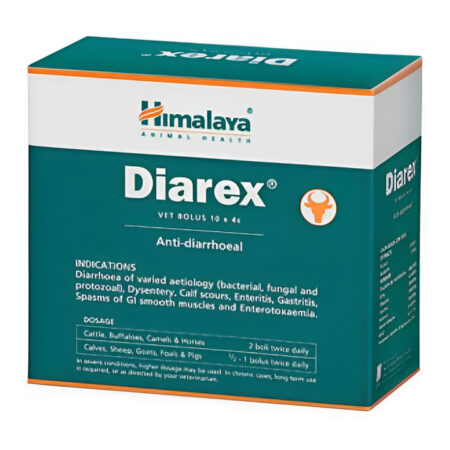
Diarex
$32.73View productsThe antibacterial and astringent actions of Diarex regularize bowel movements and are effective in the management of diarrhea or dysentery.
-
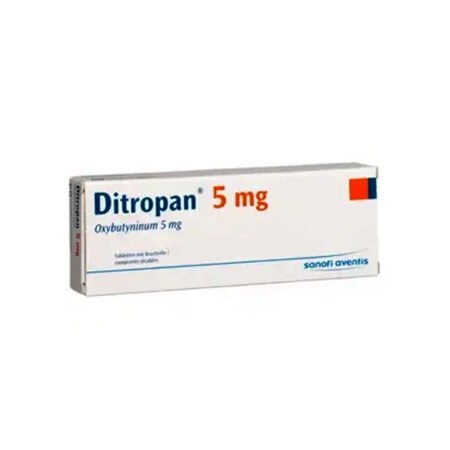
Ditropan
$77.40View productsDitropan is used for relieving symptoms of bladder problems (urinary urgency, frequency, or leakage; loss of bladder control; and painful urination) in certain patients. Ditropan is an anticholinergic. It works by relaxing muscles in the bladder.
-
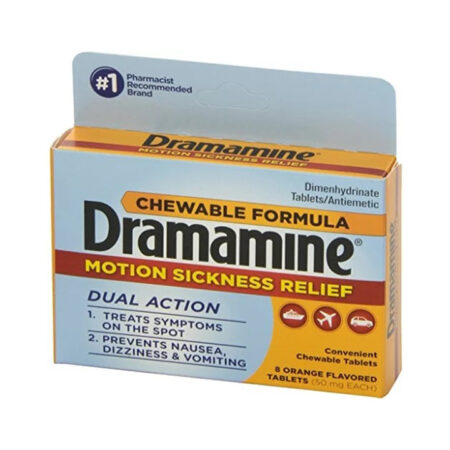
Dramamine
$65.70View productsDramamine is used for preventing and treating nausea, vomiting, and dizziness caused by motion sickness.
-
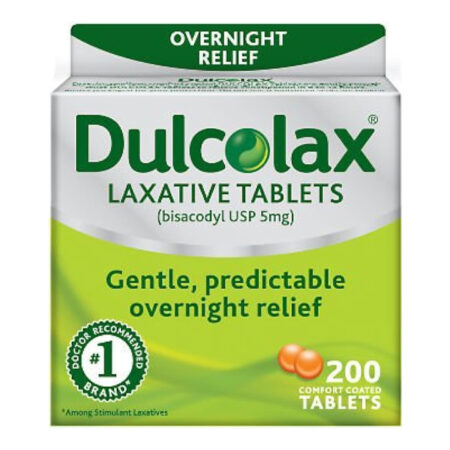
Dulcolax
$45.90View productsDulcolax is used for relieving occasional constipation and irregularity.
-
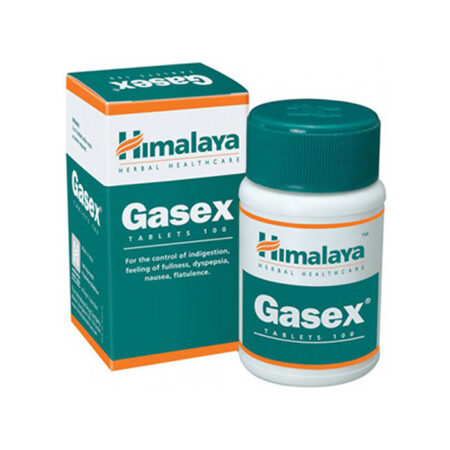
Gasex
$42.37View productsGasex helps in digestion by exerting carminative, antispasmodic, antiflatulent and antacid actions.
